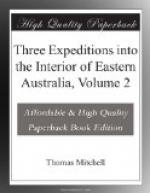Our provisions had been counted out to a day, and any delay beyond the time required to cross that country at our usual rate of travelling might have been attended with great inconvenience. Mr. Stapylton’s party, then so far behind, were depending upon us for supplies; while a labyrinth of mountains, entirely without roads or inhabitants, was to be crossed in a limited time with carts before any such supplies could be obtained and sent back. Some high and distant mountains appeared to the eastward, and in the west I intersected the hills I had previously seen which were now much nearer to us. On returning from the hill to the party we descended from the range into some flats of good open land where a solitary kangaroo became an object of intense interest now that our provisions were exhausted. The week was out for which the last of our stock had been issued in very small rations; and although most of the men had endeavoured to make this very reduced week’s allowance to last them nine days no mutton remained, nor could it well have been preserved during such hot weather. This kangaroo would have been therefore a most welcome addition to our store; but we had no dogs and I was so anxious as to venture a shot at too great a distance and to our great disappointment it escaped. We finally encamped in a valley which fell to the right or eastward, near some good ponds, and after performing a journey of upwards of 15 miles. I found near the hill I first ascended in the morning a new kind of grass with large seeds.*
(Footnote. Danthonia eriantha, Lindley manuscripts; panicula subcoarctata lanceolata, spiculis sub-4-floris gluma laevi multo brevioribus, palea exteriori laevigata basi apiceque villosissima, aristis lateralibus subulatis debilibus intermedia brevioribus, foliis setaceis vaginisque patentim pilosis, collo barbato.)
October 22.
Soon after we set out this morning we approached a range of barren hills of clay-slate on which grew the grass tree (xanthorrhoea) and stunted eucalypti. On ascending this range I perceived before me a deep ravine, and beyond it hills less promising than even these which were sufficiently repulsive to travellers with wheel-carriages. Turning therefore from that hopeless prospect towards the eastward, we crossed the head of a valley falling to the right, and after a somewhat tortuous course we gained the highest part of a range beyond it, from which a grassy vale descended on the opposite side towards the north-east. This vale turned to the left after we had followed it 2 1/4 miles and we next crossed a ridge of quartz rock.
CATTLE TRACKS FOUND.
Beyond the ridge the natives found some old cattle tracks and this intelligence very much pleased and encouraged the men.
BURNETT’S RIVULET.




